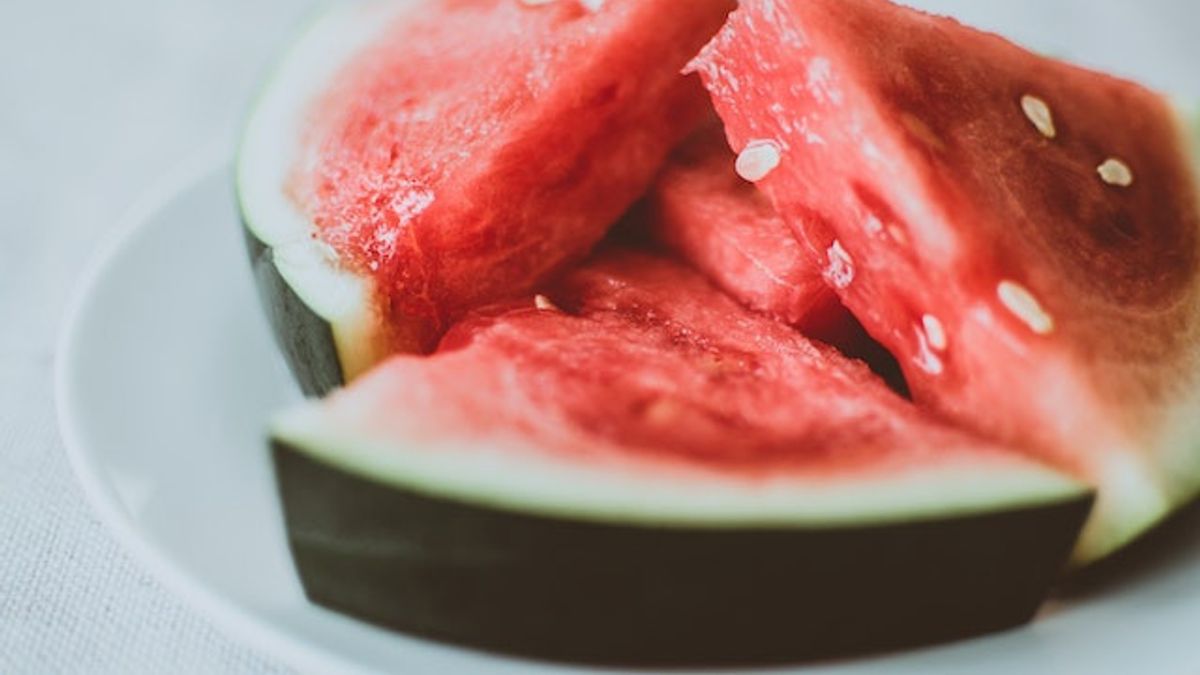JAKARTA - Semangka is believed to have been planted for the first time more than 4,000 years ago in East Africa. Sweet and watery, making this fruit the perfect treats of thirst during the summer.
Big round fruit with green skin and bright red meat are also packed with nutrients, including antioxidants, vitamins A and C. Launching Healthline, Monday, January 30, here are seven health benefits of watermelons.
Regulation of body temperature, normalizing organ function, and delivery of nutrients to cells are part of the body's process that depends if the body is hydrated. Eating foods with a high water content can help provide your body with the water needed to function properly.
Well, the watermelon consists of 92 percent water, making it the right choice for daily water intake. In addition, due to its high water content, the watermelon has low calorie levels. Consuming foods with low calories helps regulate weight by making you feel full longer.
Semangka contains various nutrients, including potassium, magnesium, as well as vitamins A and C. Semangka is also relatively low in calories, which is only about 152 grams. Semangka is also rich in citrulline, a type of amino acid that can improve the performance of the sport. In addition, this fruit also contains antioxidants, including vitamins C, carotenoids, lycopene, and biukerbitacin E.
These compounds help fight free radicals, namely unstable molecules that can damage your cells if they accumulate in your body. Over time, this damage can lead to conditions such as diabetes, heart disease, and cancer.
Some plant compounds found in watermelons, including lycopene and bicurrbitacin E, have a possible anticancer effect. Although the results of various studies, lycopene intake can be attributed to the reduced risk of some types of cancer, such as prostate and colorectal cancer.
Likopen is believed to work by lowering levels of insulin-like growth factor (IGF) in the blood, a hormone that encourages cell division. In addition, E's bicurrability can inhibit tumor growth by developing cancer cell autophagy. Autophagy is a process in which your body removes damaged cells.
Some nutrients in watermelons are believed to support heart health. Studies show that lycopene can help lower cholesterol and blood pressure. This can also help prevent oxidative damage caused by high cholesterol levels.
Semangka also contains citrulline, an amino acid that can increase levels of nitric oxide in your body. Nitric oxides help your blood vessels expand, so they can lower blood pressure.
Lycopene compounds in watermelons are also beneficial for your eyes. The macular degeneracy related to age (AMD) is a common eye problem that can cause blindness in the elderly. The role of lycopene as an antioxidant and anti-inflammatory compound can help prevent and inhibit AMD. One reaction tube study that treats eye cells with lycopene found that routine consumption of watermelons can reduce cell-destructive inflammation.
Citrulline found in watermelons can improve exercise performance and reduce muscle aches. One study found that regular intake of citrulline in the form of supplement capsules for at least 7 days improves aerobic performance by increasing the production of nitric oxides in the body. These compounds help widen blood vessels so that your heart doesn't have to work hard to pump blood throughout the body.
Vitamins A and C contained in watermelons are important for skin health. Vitamin C helps the body produce collagen, a protein that makes the skin healthy and strengthens hair. Higher vitamin C intake from food or supplements can reduce the chance of wrinkles and dry skin. Vitamin A is also important for skin health as it helps build and repair skin cells.
The English, Chinese, Japanese, Arabic, and French versions are automatically generated by the AI. So there may still be inaccuracies in translating, please always see Indonesian as our main language. (system supported by DigitalSiber.id)













